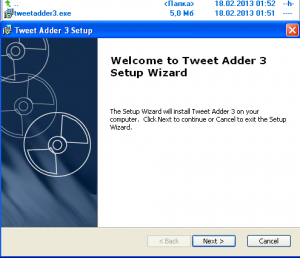
- #Tweetadder 4 crack cracked#
- #Tweetadder 4 crack full#
- #Tweetadder 4 crack password#
- #Tweetadder 4 crack crack#
While very little is known about the automated systems that analyze data companies collect, research suggests that these algorithms are prone to errors, bias, and inaccuracy. There is a growing body of evidence that some surveillance-based services may be addictive to children and lead to a wide variety of mental health and social harms. For example, some companies fail to adequately secure the vast troves of consumer data they collect, putting that information at risk to hackers and data thieves. The FTC is seeking comment on a wide range of concerns about commercial surveillance practices. And they make money by selling information through the massive, opaque market for consumer data, using it to place behavioral ads, or leveraging it to sell more products. Companies reportedly surveil consumers while they are connected to the internet – every aspect of their online activity, their family and friend networks, browsing and purchase histories, location and physical movements, and a wide range of other personal details.Ĭompanies use algorithms and automated systems to analyze the information they collect. The business of commercial surveillance can incentivize companies to collect vast troves of consumer information, only a small fraction of which consumers proactively share. Our goal today is to begin building a robust public record to inform whether the FTC should issue rules to address commercial surveillance and data security practices and what those rules should potentially look like.” “The growing digitization of our economy-coupled with business models that can incentivize endless hoovering up of sensitive user data and a vast expansion of how this data is used-means that potentially unlawful practices may be prevalent. “Firms now collect personal data on individuals at a massive scale and in a stunning array of contexts,” said FTC Chair Lina M. The FTC’s Advance Notice of Proposed Rulemaking seeks public comment on the harms stemming from commercial surveillance and whether new rules are needed to protect people’s privacy and information. Commercial surveillance is the business of collecting, analyzing, and profiting from information about people. Mass surveillance has heightened the risks and stakes of data breaches, deception, manipulation, and other abuses.
#Tweetadder 4 crack crack#
The Federal Trade Commission today announced it is exploring rules to crack down on harmful commercial surveillance and lax data security. Note: The FTC hosted a virtual news conference on the ANPR announcement. About the FTC Show/hide About the FTC menu items.News and Events Show/hide News and Events menu items.Advice and Guidance Show/hide Advice and Guidance menu items.Competition and Consumer Protection Guidance Documents.Enforcement Show/hide Enforcement menu items.Why? Because it’s straight down the middle row on a telephone keypad. 2580 seems random, but comes it at No.
#Tweetadder 4 crack full#
A full 17.8 percent of PINs are couplets, such as 7878, 8181.The 1900 PINS–1986, 1960, 1991, and so on–are extremely popular, with PINs from later in the century used the most.

For the data set used, 8068 is the “safest” password, used just 25 times out of 3.4 million.

That would be 0.2 percent of the passwords if they were randomly distributed.
#Tweetadder 4 crack cracked#


#Tweetadder 4 crack password#
Data Genetics crunched the numbers (based on “released/exposed/discovered password tables and security breaches”) used in the graphic, and came up with some fascinating finds: That perfectly diagonal yellow line streaking across it shows the frequency of 1111, 2222, etc. The first two digits are on the horizontal end the second two on the vertical end. This infographic visualizes that idea by taking all of the possible combinations and mapping them based on frequency of use.Ī data set of 3.4 million pins was used. But, we have to stress this here, people are really bad at picking passwords. We know people default to bad passwords, whether for their computers or banking PINs.


 0 kommentar(er)
0 kommentar(er)
